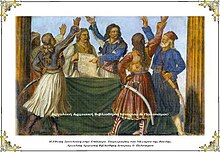First Greek National Assembly in Epidaurus
The first Greek National Assembly in Epidauros ( Greek Α΄ Εθνοσυνέλευση Επιδαύρου ) took place from December 20, 1821 to January 15, 1822 in Piada, today's Nea Epidavros .
prehistory
After the outbreak of the Greek Revolution on March 25, 1821, the Peloponnese , the islands of Hydra , Spetses and Psara and most of central Greece were under Greek control until the end of the year . The Ottomans could only maintain a few strong fortified castles . On May 26th, 1821, the Peloponnesian Senate was established in the Monastery of Kaltezon. Further meetings of the Senate under Dimitrios Ypsilantis took place on July 21 in Vervena and Zarakova. From November 4th to 9th, the Senate for Western Greece was elected in Mesolongi . At the meeting in Salona from November 15 to 20, the Areios Pagos of Eastern Greece ( Greek Άρειος Πάγος της Ανατολικής Χέρσου Versλλάδας ) was founded.
It was initially planned to hold the National Assembly in Tripoli , but since there was an epidemic there, it was moved to Argos . On December 2nd, the first participants gathered at the old church of Agios Georgios. Neofytos Vamvas gave a speech here. Because of its proximity to Nafplio , which was still in Ottoman hands, the assembly was finally moved to Piada.
Attendees
Representatives came from the Peloponnese, central Greece and the islands. Some Phanariots also came . The dispatchers of the Areios Pagos were not entitled to vote. Albanian participants also came, but they also had no voting rights. They were divided into four groups according to their origin.
List of participants
| Peloponnese | Eastern Greece | West Greece | Hydra, Spestes, Psara | Other |
|---|---|---|---|---|
|
|
|
|
Constitution
A twelve-person committee was elected, consisting of three delegates each from the four groups: Germanos von Patras, Panoutsos Notaras, Athanasios Kanakaris, Theodoros Negris, Georgios Ainian, Drosos Mansolas, Alexandros Mavrokordatos, Ioannis Kolettis, photos Karapanou, Ioannis Orlandos, Petros Omiridis Skylitzis and Anagnostis Monarchidis. This committee, with Alexandros Mavrokordatos as president, had the task of writing the constitution together with the Italian Vincenzo Gallina . The constitution was ratified on December 20, 1821 . It was called the "Temporary Constitution of Greece ( Greek Προσωρινόν Πολίτευμα της Ελλάδος ).
The constitution had 107 paragraphs and was influenced by the American and French constitution. Orthodox Christianity became the state religion, but other religions were tolerated. All citizens were equal before the law and strangers also had the same civil rights. The constitution provided for a monarch. This was due to the fact that the Western monarchies viewed democratic aspirations in other countries with suspicion, because they were afraid that they might find imitators in their own country. However, the monarch's powers were severely limited.
Athens was chosen as the capital . However, as long as this was not in their hands, Corinth acted as the capital. The phoenix coat of arms was replaced by the owl of Athena and the black flag of Filiki Eteria by a blue and white flag. The army from then on carried a blue flag with a white cross, and the ships sailed under a flag with thirteen blue and twelve white horizontal stripes.
The government was divided into two parts, a legislative and an executive. The legislative government, also known as the Senate, was composed of representatives from the provinces and consisted of 33 representatives. The executive government enforced the Senate-made laws. She could also refuse. The executive council consisted of five representatives. He also appointed the ministers. The Ministry of the Navy was staffed by three ministers - one each from Hydra, Spetses and Psara.
Representative
| Legislative government | Executive government | |
|---|---|---|
| president | Dimitrios Ypsilantis | Alexandros Mavrokordatos |
| Vice President | Sotirios Chalambous | Athanasios Kanakaris |
| secretary | Ioannis Scandalidis | |
| Members |
|
|
minister
| minister | |
|---|---|
| President of the Council of Ministers and Foreign Minister |
Theodoros Negris |
| Home Office | Ioannis Kolettis |
| Ministry of Finance | Panoutsos Notaras |
| War Department | Notis Botzaris |
| Ministry of Justice | Theodoros Vlasios |
| Ministry of Religion | Josif of Antrousis |
| Ministry of Police | Lambros Nakos |
| Department of the Navy |
|
Web links
literature
- Thomas Keightley : History of the War of Independence in Greece , Edinburgh 1830, pp. 1–25 ( online )
Individual evidence
- ↑ Münchner Blätter for Art, Fine Literature and Entertainment , No. 1, January 3, 1946, p. 553 ( online )
- ↑ "Προσωρινόν Πολίτευμα της Ελλάδος". 1 Ιανουαρίου 1822.
- ↑ Wolf Seidl: Bavaria in Greece , Munich 1965, pp. 53–54


